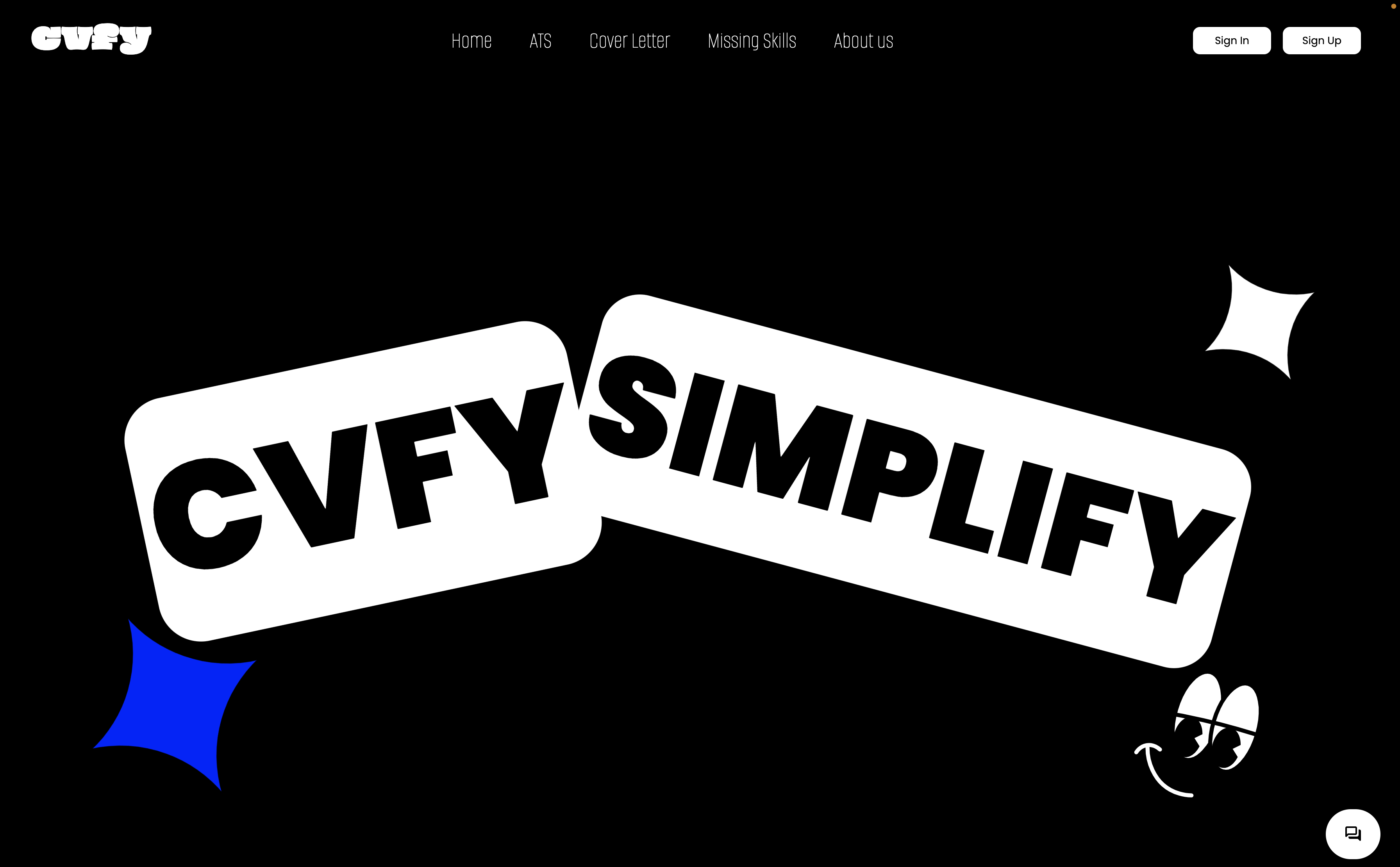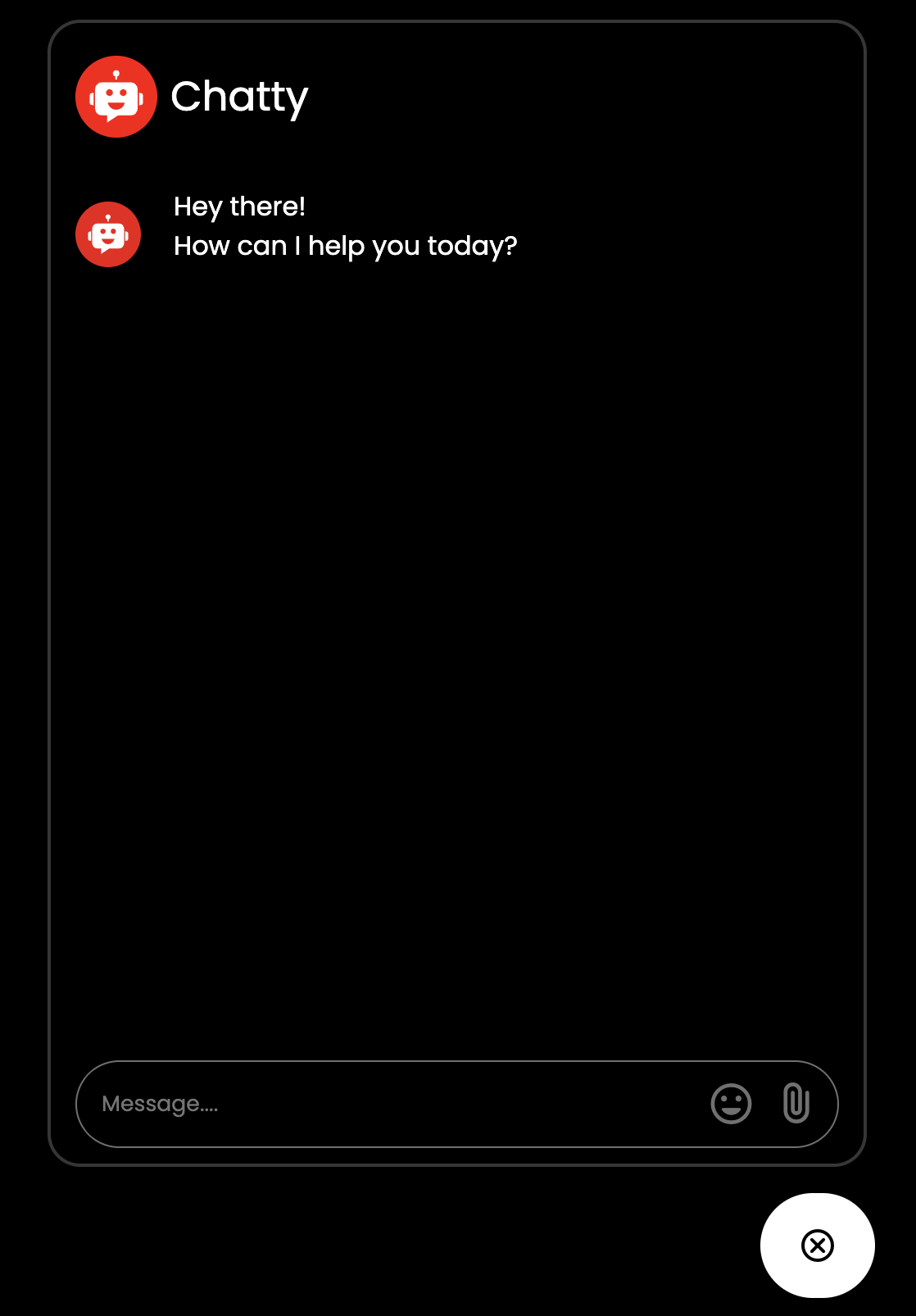Chatty



 CVFY is your ultimate AI-powered career companion, designed to help you stand out in today’s competitive job
market. Our platform ensures your resume passes ATS (Applicant Tracking System) checks with ease, identifies
missing skills tailored to your desired role, and provides personalized career roadmaps to help you bridge
the gap. Struggling with cover letters? CVFY generates compelling, job-specific cover letters in seconds.
Plus, our intelligent chatbot is always available to guide you and answer your career-related questions.
Whether you're starting out or making a big leap, CVFY equips you with everything you need to succeed and
land your dream job with confidence.
CVFY is your ultimate AI-powered career companion, designed to help you stand out in today’s competitive job
market. Our platform ensures your resume passes ATS (Applicant Tracking System) checks with ease, identifies
missing skills tailored to your desired role, and provides personalized career roadmaps to help you bridge
the gap. Struggling with cover letters? CVFY generates compelling, job-specific cover letters in seconds.
Plus, our intelligent chatbot is always available to guide you and answer your career-related questions.
Whether you're starting out or making a big leap, CVFY equips you with everything you need to succeed and
land your dream job with confidence.
 At CVFY, we use AI to optimize your resume for Applicant Tracking Systems (ATS), ensuring it meets industry
standards and stands out to recruiters. Here’s how it works:
At CVFY, we use AI to optimize your resume for Applicant Tracking Systems (ATS), ensuring it meets industry
standards and stands out to recruiters. Here’s how it works:
- ATS Compatibility: Our AI scans your resume for key keywords like job titles, skills, and certifications.
- Keyword Optimization: It compares your resume to the job description to identify missing or underused keywords.
- Actionable Feedback: Receive personalized suggestions to improve keyword relevance and pass ATS filters.
- Increased Visibility: By optimizing for keywords, CVFY ensures your resume gets noticed by recruiters.
 At CVFY, we simplify writing a compelling cover letter with our AI-powered solution. By providing the job
description and uploading your resume or key details, our AI crafts a tailored, professional cover letter in
seconds. Here’s how it works:
At CVFY, we simplify writing a compelling cover letter with our AI-powered solution. By providing the job
description and uploading your resume or key details, our AI crafts a tailored, professional cover letter in
seconds. Here’s how it works:
- Instant Tailored Drafts: Upload your resume and job details to generate a customized cover letter.
- Job and Profile Alignment: The AI matches your skills and experiences to the job requirements for a relevant letter
- ATS Optimization: Key terms are included to ensure your cover letter passes Applicant Tracking Systems.
 Our AI-powered Skills Matcher helps you identify and address skill gaps, focusing on technical and
role-specific abilities. It ensures your skill set aligns with the job you’re targeting by providing
tailored recommendations. Here’s how it works:
Our AI-powered Skills Matcher helps you identify and address skill gaps, focusing on technical and
role-specific abilities. It ensures your skill set aligns with the job you’re targeting by providing
tailored recommendations. Here’s how it works:
- Targeted Analysis: Analyzes your resume, job description, and company requirements to identify missing technical skills.
- Gap Identification: Pinpoints key hard skills that are critical but underrepresented in your profile.
- Tailored Recommendations: Offers actionable advice, such as relevant courses or certifications to bridge the gaps.
- Skills Alignment: Ensures your skills match the demands of the desired role and company.
 Our AI-powered chatbot provides an efficient way to enhance your CV through advanced artificial
intelligence. By uploading an image of your resume, the chatbot analyzes the content and offers personalized
feedback. Whether you need advice on formatting, optimizing for ATS, improving phrasing, or refining
specific sections like your skills and experience, the chatbot delivers real-time suggestions. It helps you
correct errors, improve clarity, and ensure your resume effectively highlights your strengths. With its
AI-driven assistance, the chatbot ensures your CV is professional, polished, and optimized for job
applications, making the entire process faster and more intuitive.
Our AI-powered chatbot provides an efficient way to enhance your CV through advanced artificial
intelligence. By uploading an image of your resume, the chatbot analyzes the content and offers personalized
feedback. Whether you need advice on formatting, optimizing for ATS, improving phrasing, or refining
specific sections like your skills and experience, the chatbot delivers real-time suggestions. It helps you
correct errors, improve clarity, and ensure your resume effectively highlights your strengths. With its
AI-driven assistance, the chatbot ensures your CV is professional, polished, and optimized for job
applications, making the entire process faster and more intuitive.
 CVFY is your AI-powered career companion, helping you stand out in today’s job market. From ATS-friendly resumes to skill-gap analysis, personalized career roadmaps, and job-specific cover letters, we’ve got you covered. Our chatbot is always ready to guide you, ensuring you have the tools to land your dream job with confidence.
CVFY is your AI-powered career companion, helping you stand out in today’s job market. From ATS-friendly resumes to skill-gap analysis, personalized career roadmaps, and job-specific cover letters, we’ve got you covered. Our chatbot is always ready to guide you, ensuring you have the tools to land your dream job with confidence.
 At CVFY, we use AI to make your resume ATS-friendly, ensuring it catches recruiters' attention. Our AI scans for crucial keywords, compares your resume with job descriptions, and provides actionable feedback to improve keyword relevance. By optimizing your resume, CVFY boosts your chances of standing out and landing the job.
At CVFY, we use AI to make your resume ATS-friendly, ensuring it catches recruiters' attention. Our AI scans for crucial keywords, compares your resume with job descriptions, and provides actionable feedback to improve keyword relevance. By optimizing your resume, CVFY boosts your chances of standing out and landing the job.
 CVFY makes cover letter writing effortless with our AI-powered tool. Simply provide the job description and your resume, and our AI creates a professional, tailored cover letter in seconds. It aligns your skills with job requirements, includes ATS-friendly keywords, and boosts your chances of landing an interview with ease.
CVFY makes cover letter writing effortless with our AI-powered tool. Simply provide the job description and your resume, and our AI creates a professional, tailored cover letter in seconds. It aligns your skills with job requirements, includes ATS-friendly keywords, and boosts your chances of landing an interview with ease.
 CVFY’s AI chatbot enhances your CV with real-time, personalized feedback. Simply upload your resume, and it analyzes formatting, ATS compatibility, phrasing, and key sections. Get instant suggestions to refine your skills, improve clarity, and make your resume job-ready with ease.
CVFY’s AI chatbot enhances your CV with real-time, personalized feedback. Simply upload your resume, and it analyzes formatting, ATS compatibility, phrasing, and key sections. Get instant suggestions to refine your skills, improve clarity, and make your resume job-ready with ease.
- Personalization
- Clarity
- Impression
- Relevance
- Strategy
- Goal Setting
- success Blueprint
- Future planning
- Job Matching
- Keyword Optimization
- Application Tracking
- Resume Analysis
- Skill Matcher
- Job Fit
- Talent builder
- Skill gap
Meet your Developers




Should my resume be in PDF or Word format?
It’s generally better to use a PDF for your CV unless specifically instructed otherwise. Here’s why:
- Preserves Formatting: PDFs ensure that the layout and design of your CV remain consistent, regardless of the device or software used to open it.
- Professional Appearance: PDF files look more polished and professional compared to Word documents, which may open differently depending on software versions.
- Compatibility: PDFs are universally compatible with almost all systems.
- Editable Situations: If the employer requests an editable format (like Word), provide that instead.
Always follow the specific instructions in the job listing.
Should I send a cover letter with my resume?
It’s generally a good idea to send a cover letter along with your CV unless the job listing specifically states it’s not required. Here’s why:
- Showcases Your Interest: A cover letter gives you the opportunity to explain why you're interested in the role and how you align with the company's values or goals.
- Highlights Key Skills: You can elaborate on achievements or experiences that are particularly relevant to the position, which might not be as detailed in your CV.
- Personal Touch: It adds a personal element, showing effort and enthusiasm, which can make a positive impression on recruiters.
When Not to Send a Cover Letter: If the job listing explicitly says "No cover letter required," follow those instructions. Otherwise, err on the side of sending one.
Tip: Tailor your cover letter to the specific job and company to make it impactful. Keep it concise and professional!
Why do I have to make a different resume for every job application?
You should tailor your resume for every job application because it increases your chances of standing out to employers. Here’s why:
- Relevance: Different jobs require different skills and experiences. Customizing your resume allows you to highlight the qualifications most relevant to the specific role.
- Keywords: Many companies use Applicant Tracking Systems (ATS) to screen resumes. By aligning your resume with the job description, you ensure it contains the keywords needed to pass the initial screening.
- Demonstrates Effort: A tailored resume shows the employer you’ve taken the time to understand their needs and explain why you’re the right fit for the role.
- Competitive Edge: Generic resumes can get overlooked, especially if other candidates have tailored theirs to the job.
Tip: You don’t have to start from scratch each time—have a master resume and adapt it for each job by tweaking sections like the objective, skills, and work experience to match the role.
What is the ideal length for a CV?
The ideal length for a CV depends on your experience:
- For most roles, a one-page CV works well, especially for students or professionals with less experience.
- If you have extensive experience or multiple relevant achievements, a two-page CV is acceptable.
.jpg)












